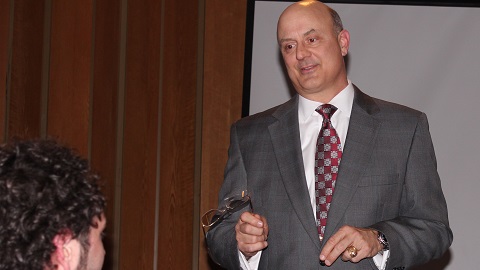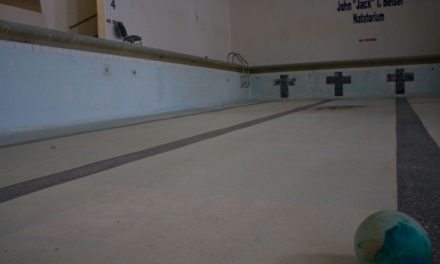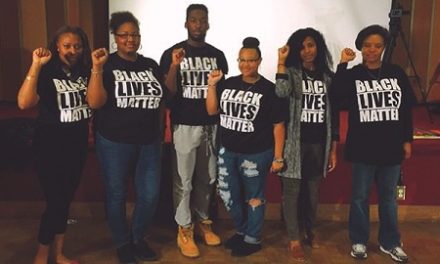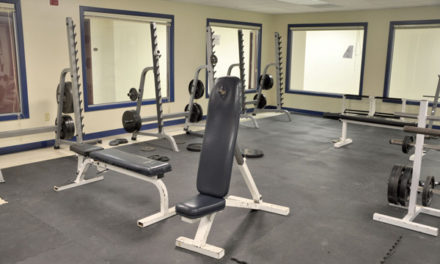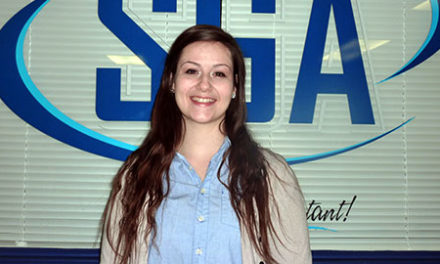By Brittany Wilson and Kristen Griffith (Whetstone Staff Writers)
After a unanimous vote, Wesley College’s Board of Trustees announced on March 16 that Mr. Robert E. Clark II would serve as the 17th president of Wesley College after Dr. William Johnston’s retirement in July.
Wesley students, faculty and staff were introduced to the two finalists for the presidential position—Clark and Lee King— in early March at open meetings.
Everyone had their own personal preferences, but the final decision—the deciding vote—was up to the Board of Trustees.
Clark said he was confident in his ability to win throughout the presidential search process.
“As the process progressed I became more humbled and excited with the possibility of potentially becoming the next President, and having the privilege of serving the Wesley College family,†he said.
Fred Sottnick, member of the Presidential Selection Committee and SGA president, said he was not surprised by the Board’s choice.
“Clark seemed like the most likely candidate of the two, so I wasn’t dumbfounded that they ended up choosing him,†he said. “He was my preference—as an advocate of the student body, I thought he would be the best fit for us collectively.â€
Freshman Betty Lee said she was excited to find out her favorite candidate was elected.
“I am not too surprised by the results,†she said. “The other candidate was simply a cookie-cutter-I’ve-done-this-before kind of guy, whereas Clark seemed to have more initiative.â€
Sophomore Kenny Ciccoli said the final two candidates reminded him of Mitt Romney and Barack Obama in the 2012 US election.
“Obama won the election and has significantly assisted the economy—not because he is the smartest economically, but because he knows how to talk to people, he knows how to bring people together, and he can change attitudes with his conversational skills. Bob Clark presents this kind of leadership,†he said.
Presidential Selection Committee members Drs. Jack Barnhardt and Linda De Roche were much more surprised when they heard the news.
“At our final meeting and throughout the selection process, the Board played their cards very close to the vest,†said De Roche, a professor of English. “When it came down to our two final candidates, they were both so qualified and they both had a series of strengths and weaknesses—very different from each other’s— it was just a matter of which candidate is the best fit for Wesley right now.â€
Barnhardt agreed.
“I was happy that they picked Clark,†said the associate professor of psychology. “Clark is a little more of a gamble than King, who was the safe bet and would be much more predictable. But I am excited that Clark is someone who is very a different, unconventional candidate.â€
“Unconventional†was a popular word used to describe Wesley’s incoming president.
Having served in the military for nearly 30 years, most of Clark’s leadership experience has been in the Navy, not in higher education. Not only was he the Commandant of Midshipmen at the Naval Academy, but he also was the commanding officer of the nuclear powered submarine USS Connecticut, the commodore of Submarine Squadron Four, and the joint service coordinator for Penn State University.
Barnhardt said this made him nervous when he first reviewed Clark’s application.
“My only exposure to the military is really through movies, TV and Tom Clancy books—the higher you are in rank the more you direct those lower than you in rank, and those who are higher will then direct you,†he said. “Evidently it doesn’t really work that way—when they are making decisions of higher levels they are very collaborative. It isn’t just ‘we’re doing this because this is the way I say we’re doing it,’ which is not what we would want in a president.â€
De Roche was also concerned about Clark’s military background.
“I had my view of the military that it is a very top-down organization,†she said. “Somebody barks an order and then you jump, salute and say ‘yes sir.’ Over the time Clark was on campus, though, he laid to rest all of my doubts about his leadership style. I sense that he will be very collaborative.â€
Clark said he served in senior leadership positions in higher education. He said Commandment of Midshipman is equivalent to an Executive Vice President. He was also a Joint Service Coordinator, which is equivalent to a Department Chair.
“Though each leadership position, as well as schools, have their unique cultures, demands, and challenges, a commonality/ approach that I firmly believe in, is that a leader is a facilitator for those that they have the privilege of serving – ever mindful of their needs, and ensuring they have the freedoms, materials, opportunities, and support to succeed,†Clark said.
He said he plans to go out and get to know the members of Wesley College by following his leadership philosophy, “listen, learn, and lead.â€
De Roche said she hopes Clark will create a cooperative climate on campus.
“Ideally, we need a president who will lead us to a coherent vision—a vision that we all share, so we are working from the same script with the same goals, which is ultimately about what is best for the students,†she said.
Sottnick also hopes Clark will sponsor students.
“Here’s my advice from president to president,†he said. “Be an advocate for student rights, student autonomy and independence.â€
Clark said he is excited about joining Wesley.
“Most importantly, I look forward to working closely with the entire Wesley College Family, and together we all have the privilege of molding and mentoring our nation’s future, and national treasures, which are you, our student body,†he said.

